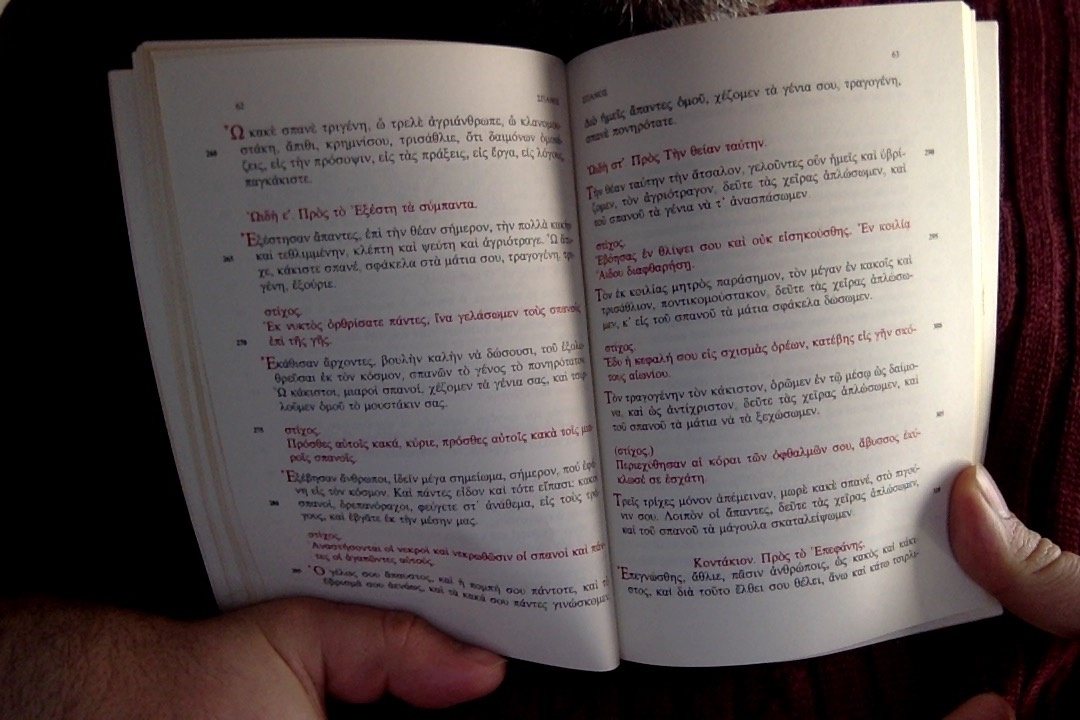I’ve name-checked the Mass of the Beardless Man (Spanos) in Nick Nicholas’ answer to What is the dirtiest work of Modern Greek literature? I have been asked to provide a sample, and herewith I oblige.
Spanos was written around 1500, in Northern Greece or Constantinople; I’ve noted the speculation by Tassos Karanastassis, that it was millenarian panic in reaction to the arrival of Sephardic Jews in 1492. Spanos was first published in Venice in 1553, and was a popular publication; it is also attested in two manuscript versions from around the same time, which are if anything even filthier.
The scholarly edition of Spanos is: Spanos, ed. Hans Eideneier, 1977. Berlin: De Gruyter. The popular edition of Spanos is: Σπανός, ed. Hans Eideneier, Athens: Ερμής, in the pocket Νέα Ελληνική Βιβλιοθήκη series. And God bless him, Eideneier has actually used red letters for the headings, capitals, and tunes, just as Greek missals do.

I’m going to post small excerpts of the work here, to give you a flavour of it. If you are likely to take offence at scatological parodies of the Greek Orthodox Mass, and particularly the Epitaphios (liturgical), the Lamentation of Good Friday, you will take offence. Don’t read further.
Much of Spanos is a word-perfect parody of sections of the Orthodox Mass, and it will make more sense to people familiar with it than those not. Given that most Greeks know the Lamentation of Good Friday, they’re going to recognise a fair bit. Line numbers from the scholarly edition.
Sunday Vespers (lines 9–41)
Στιχηρά. Ἦχος πλάγιος δʹ, πρὸς τὸ Ὢ τοῦ παραδόξου θαύματος.
στίχ. Ἐκ βαθέων ἐκέκραξας τοῦ δοθῆναί σοι γένειον καὶ οὐκ εἰσηκούσθης.
Ὢ τοῦ παραδόξου θαύματος, ἂν ἀπαντήσῃς σπανόν, τὸ μουστάκιν του κλάσε το, ἔκβαλε τὸ γένιν του καὶ κλότσον τὸν εὐεργέτησε τὸν οὔριόν τε καὶ τὸν ἐξούριον. Καὶ ταῦτα λέγε πρὸς τὸν παγκάκιστον· ὦ ξυλογούργουρε καὶ ἀγριομούστακε, κακὲ σπανέ, ἄπιθι, κρημνίσθητι, ζῶον παγκάκιστον.
στίχ. Γενηθήτω τὰ ὦτά σου προσέχοντα εἰς τὴν φωνὴν τοῦ ὑβρίζοντός σε.
Ὢ τοῦ παραδόξου θαύματος, ἂν ἀπαντήσῃς σπανὸν καὶ ἱδρώνῃ τὸ γένιν του, χαῖρε, τράγε, λέγε του, καὶ βοθρακοῦ ἀποσκέλλωμα, γραίας μὲν αἴγας ἀνακακάρωμα. Καὶ κράξας μέγα πρὸς αὐτὸν βόησον· ὦ σπιθαμόστομε καὶ μυρμηγκοσφόνδυλε, κακὲ σπανέ, ἅλας εἰς τὰ μάτια σου, κόπρος στὰ γένια σου.
Sticheron hymns. 4th Plagal Mode, to the tune of “O Strange Marvel”.
Verse: From the depths hast thou cried out, that thou mayst be granted a beard; and thy prayer was granted not.
O strange marvel, if you should meet a beardless man, fart on his moustache, pluck his beard, and favour him with a kick, that sconehead and skinhead. And say thus to him, most evil: O thou wood-throat and savage-moustache, evil beardless man, be gone, be crushed, most evil beast.
Verse: Be thine ears be as one noting the voice of him who insults thee.
O strange marvel, if you should meet a beardless man and his goatee sweats, “Hail, Goat,” say unto him, “and Desiccation Of A Toad, and also Reskulling Of An Old Goat.” And shouting mightily cry unto him: O thou with a cubit-sized mouth and an ant’s spine, evil beardless man, salt unto thine eyes, and dung unto thy goatee.”
…
And then the Readings (94–102)
Προφητείας μυοβατράχου τὸ ἀνάκλασμα.
Τάδε λέγει βάτραχος ταῖς χελώναις, ὅτι ἔρχεται ἄνθρωπος πολλὰ ἐφύβριστος καὶ ἐὰν φανῇ τοῖς ἀνθρώποις, ἠξεύρετε ὅτι ἔναι φάντασμα, διότι δὲν θέλει ἔχει γένια, καὶ ἔναι σημεῖον, ἐπειδὴ οὐδὲ ἄνδρας ἔναι οὐδὲ γυναίκα, καὶ ἔχει διπλῆν τὴν φύσιν ὥσπερ τὰ μουλάρια. Καὶ ἂν πολλάκις καὶ ἐβγάλῃ γένια, εἶναι ὥσπερ τράγου ἐξ ὄρους. Καὶ ἐπὶ τῆς κοίτης αὐτοῦ τὰ ὄρνεα κοιτασθήσονται. Καὶ ἡ κεφαλὴ αὐτοῦ ὁμοία τράγου. Καὶ ὀνειδισθήσεται καὶ γέλιον φανήσεται ἐν ὅλῳ τῷ κόσμῳ.
The reeking of the Prophecy of the Mouse And Frog
Thus saith the frog unto the turtles: that a man cometh who is much to be sworn at, and if he should appear unto people, know that he is a ghost, for he will have no beard, and it is a portent, for he is neither man nor woman, and he has a double nature like mules. And if he manages to have a beard, it is like a goat’s from the mountain. And the vultures shall sleep on his bed. And his head is like unto a goat’s. And he shall be mocked and regarded as a laughing-stock unto the whole world.
Here endeth the reeking.
…
Sunday Matins (211–248)
Μετὰ τὴν αʹ Στιχολογίαν, Κάθισμα καὶ παλούκιν εἰς τὸν κῶλον σου.
Πρὸς Τὴν σοφίαν τοῦ λόγου.
Τὸν σπανὸν τὸν τριγένη, τὸν ταπεινόν, τὸν ἀντζάτον, κωλάτον καὶ μιαρὸν ἐλθόντες ὑβρίσωμεν, τὴν πανάσχημον θέαν του. Καὶ γὰρ ὁμοιάζει τράγου καὶ ὄνου ὁ ἄθλιος. Ἔχει καὶ γνώμην λύκου καὶ δόλον ἀλώπεκος. Ὅθεν διὰ τοῦτο ὀνειδίζουσι πάντες αὐτὸν τὸν τρισάθλιον καὶ βοῶσιν οἱ πάντες αὐτῷ· Φεῦγε, σπανέ, ἀπ’ ἐμπρός μας, πέσε εἰς βάραθρον. Καὶ γὰρ ἔχεις δαιμόνων ἐπίσκεψιν.
Μετὰ δὲ τὴν βʹ Στιχολογίαν, Κάθισμα καὶ ’πιθετὸν εἰς τὸν κῶλον σου.
Πρὸς τὸ Κατεπλάγη.
Κατεπλάγησαν ὁμοῦ ἄνδρες, γυναῖκες καὶ παιδιά, θεωρῶντα τὸν σπανὸν τὸν τραγογένην, τὸν τρελόν, πῶς τρίχας ὅλως οὐκ ἔχει εἰς τὸ πιγούνιν· μόνας δὲ τὰς τρεῖς καὶ αὐτὲς παράσημες. Καὶ τράγον ἂν ἰδῇς ὅπως ὁμοιάζει του. Καὶ γὰρ οἱ πάντες γελοῦσι τον καὶ ὑβρίζουν, ὅσοι ἔχουν γένια, ὡς κλέπτην, ψεύτην καὶ κάκιστον ἄνθρωπον.
After the first sticheron, a Kathisma, and a pole up your arse.
To the tune of “The Wisdom of Thy Word”
The beardless man with three chin hairs, lowly, big-thighed, big-arsed and unclean, come let us swear at his most ugly aspect. For miserable as he is, he looks like unto a goat and a donkey. He hath also the mind of a wolf and the cunning of a fox. Hence let all insult him, thrice miserable, and let all shout unto him: Be gone, beardless man, from before us, fall into a pit. For thou art in the company of demons.
After the second sticheron, a Kathisma, and a compress up your arse.
To the tune of “He Was Astonished”
They were astonished, men, women and children together, seeing the beardless man as one with a goat’s goatee, one who is mad, that his chin has no hairs at all, but three alone, and those malformed. And if you see a goat, you shall see how he resembles him. For all mock him and insult him, who have beards, as a thief, a liar, and a truly evil man.
…
The Canon of the Most Evil Beardless Man (296–315)
Τοὺς Εἱρμοὺς ἀνὰ βʹ καὶ τὰ τροπάρια ἀνὰ βʹ.
Ἦχος δʹ. Ὠιδὴ αʹ. Πρὸς τὸ Ἀνοίξω τὸ στόμα μου.
Ἀνοίξω τὸ στόμα σου καὶ βάλω τρία δαμάσκατα καὶ προῦνον καὶ βάτσινον καὶ ἀγελάδας πορδήν. Καὶ ὀφθήσομαι μαδεῖν τὴν σὴν μουστάκαν, τὴν ἀγριωμένην τε καὶ κοπρομούσουδον.
στίχ. Κύριος συντρίβων τοὺς σπανοὺς καὶ πᾶσαν τὴν δύναμιν αὐτῶν ἔρριψεν εἰς Τάρταρον.
Ἀνοίξῃ ἡ κοιλία σου καὶ τὰ πλευρά σου ῥαΐσουσι καὶ πέσῃ ἡ μύτη σου καὶ τὰ νεφρά σου σαποῦν· καὶ τὰ πόδια σου κομμάτια νὰ γενοῦσι καὶ ξερὰ τὰ χέρια σου, σπανὲ παγκάκιστε.
Each Irmos to be chanted twice, and each Troparion twice.
4th mode. Ode 1. To the tune of “I shall open my mouth”.
I shall open thy mouth and place three plums, a prune, a blackberry, and a cow fart. And I shall see thy moustache plucked, which has grown wild and dung-snouted.
Verse: The Lord has crushed the beardless men and has cast all their might into Hades.
Thy belly shall open up, and thy ribs shall crack, and thy noise shall drop off, and thy kidneys rot; and thy feet shall be crushed to pieces, and thy hands dry up, most evil beardless man.
…
The Life (Synaxarium) of the Unblessed Beardless Man (541–562)
Σπανοῦ γέννησις, καὶ τίς ἂν γένοιτο πρῶτος πρὸς τὴν διήγησιν; Διήγησις δὲ μεγάλων ἔργων καὶ θαυμασίων κακῶν, καὶ πολὺν τὸν γέλωτα τοῖς ἀκροωμένοις ἐμποιεῖν δύναται, οὐ μόνον ἀνθρώπων, ἀλλὰ καὶ ζώων ἀλόγων, καὶ ἁπλῶς εἰπεῖν, καὶ πάντων τῶν κτηνῶν.
Γεννᾶται μὲν οὗτος οὔτε ἐπὶ ἡμέραν οὔτε ἐπὶ νύκτα, ἀλλ’ ἐν ἀωρίᾳ. Ἤστραπτε μὲν κατὰ ἀνατολάς, κατὰ δὲ δύσιν ὀγκηθμὸς ἦν οὐκ ὀλίγος. Πᾶσα μὲν ἀνθρώπων φύσις σύντρομος γέγονε, πᾶσα δὲ ζώων καὶ πετεινῶν καὶ κτηνῶν. Καὶ πολλῶν ἡμιθνήτων γεγονότων ἐκ τῆς ταραχῆς καὶ τοῦ φόβου, μία ὄνος ἔγκυος οὖσα ἀπέρριψεν οὐ μετ’ ὀλίγης βίας ἔκπτυστόν τι καὶ πονηρότατον γένος τουτὶ τῶν σπανῶν.
Καὶ γεννηθέντων ἀπέδοτο αὐτοὺς διδασκάλῳ τινὶ τῶν δαιμόνων εἰς αὔξησιν καὶ παίδευσιν. Αὐξηνθέντων δὲ καὶ εἰς μέτρον ἡλικίας φθασάντων συνέδριον ἐποίησαν, ἵνα πρὸς ἀνθρώπους ἀφίξωνται, ἵνα πρῶτόν τινα ἑαυτῶν ποιήσωσι βασιλέα. Καὶ τοῦτο ποιήσαντες ἐποίησαν βασιλέα παγκάκιστον οὔριόν τινα ἢ μᾶλλον εἰπεῖν ἐξούριον, οὐ μὴν δὲ ἀλλὰ καὶ ξυγγόκωλον καί, συνελόντι φάναι, σκατοπρόσωπον, ἔτι δὲ ἀντζάτον, κωλάτον, βιλλάτον, χεσάτον, φασάτον, ἀναχεσομούσουδον καὶ φασκελάτον. Καὶ ποιήσαντες αὐτὸν βασιλέα ἔθεσαν ἐπάνω σούβλας ὡς ἐπὶ θρόνου ὑψηλοῦ καὶ ἐπηρμένου. Ὁ δὲ ἐλθὼν ἐν τῇ βασιλείᾳ ἤρξατο λέγειν πρὸς τοὺς ὑπ’ αὐτὸν σπανούς· ἐλθεῖν ὑμᾶς βούλομαι, σπανοί, πρός με τοῦ δοῦναι τέλος βαρὺ τῶν τριῶν ἐτῶν, ὧνπερ ὑπῆρχεν ἔγκυος ἡ ὑμῶν μήτηρ ὄνος, ἡ κοντόκερκος καὶ μονόφθαλμος.
The birth of the beardless man; and who shall be the first to tell its tale? For it is a narration of great works and wondrous evils, and it can cause much laughter to those who hear it, not only people, but unreasoning beasts too, and all animals.
For he was born not during the day nor yet during the night, but in timelessness. There was lightning in the east, and no small famine in the west. And the nature of humanity entire did tremble, and of all animals and birds and living things. And many were half-way dead from fear and tumult, and one pregnant donkey did miscarry, with no small violence, this despicable and most evil race of beardless men.
And when they were born, they were led to a certain teacher from the demons, that they may be reared and educated. And when they grew and came to the fullness of age they made a council, that they should go out to men, so that one of their number should be made their king. And doing so, they made their king a most evil, sconehead or rather skinhead, and also fat-arsed, and in sum, shit-faced, moreover big-thighed, big-arsed, big-dicked, shitty, spitty, cack-re-besnouted and be-mountza’d. And making him their king they seated him on pikes, as if they were a proud and high throne. And when he became king, he started to say to the beardless men in his service: I wish you to come to mine aid, O beardless men, that I may put a heavy end after the three years that your mother the short-tailed and one-eyed donkey carried you in her belly.
…
The Polyeleos [“Much-Merciful”: festive portion of the Matins on feast days] and Lauds (918–925)
Καί, εἰ μὲν βούλει, τὸν μολυνέλεον καὶ βρομιέλεον τοῦ ἀνοσίου σπανοῦ λέγε οὕτως·
Μισεῖτε τὸ ὄνομα τῶν σπανῶν καὶ μισεῖτε αὐτούς, ὅτι καλόν.
Ὅτι τὸν σπανὸν ἐξελέξαντο ἄνθρωποι εἰς ὀνειδισμόν, ὅτι καλόν, εἰς περιουσιασμὸν τοῦ γέλωτος αὐτοῦ, ὅτι καλόν, ὅτι εἰς τὸν αἰῶνα.
Ὅτι ἐγὼ ἔγνωκα, ὅτι μέγας πονηρὸς οὗτος παρὰ πάντας τοὺς σπανούς.
Ὅτι πάντες οἱ σπανοὶ γέλως εἰσὶν τῶν ἀνθρώπων, ὁ δὲ σπανὸς τὸ πονηρὸν ἐποίησεν, ὅτι εἰς τὸν αἰῶνα ὁ γέλως αὐτοῦ.
And then, at will, chant the Much-Worse-iful and Much-Curse-iful of the Unblessed beardless man thus:
Hate ye the name of beardless men, and hate them as well; for it is good.
For the beardless man has been chosen by mankind for mockery, for it is good, for common ownership of laughter against him, for it is good, even unto the ages.
For I have known that this man is of great evil exceeding all other beardless men.
For all beardless men are a laughing-stock of humanity, and the beardless man has done evil, for laughter against him shall there be even unto the ages.
…
The Epitaphios Lamentation of the Beadless Man
First Stasis (1049–1076)
Μετὰ δὲ ταῦτα ψάλλομεν τὸν ἐπιτάφιον τοῦ σπανοῦ· εἰσὶ δὲ μαγαρισνάρια λεγόμενα εἰς τὸν ἐνταφιασμὸν τοῦ κοπρογένη σπανοῦ.
Μετὰ τὴν συνήθη στιχολογία καὶ τὰ ἑξῆς, ἀρχόμεθα τοῦ ἀνόμου ψάλλοντες τὰ τροπάρια ἐκ δευτέρου, εἰς Ἦχον πλάγιον αʹ.
<Στάσις πρώτη>
Μαγαρίζομέν σε, κλανογένη σπανέ, καὶ τσιρλοῦμεν τὴν χεσάδα πατσάδα σου ὡς ἀντίτυπον τοῦ κώλου μας μορφήν.
στίχ. Μαγάριοι οἱ ἄνομοι σπανοί, ἐν ὁδῷ οἱ σπανοὶ ἀπολοῦνται, καὶ μακάριοι οἱ ἐξερευνῶντες τὰς πράξεις αὐτῶν, καὶ ἀπέχουσιν ἀπ’ αὐτούς.
Μαγαρίζομέν σε, κακογένη σπανέ, καὶ ὑβρίζομεν τὴν ἄσχημον θέαν σου ὡς ἀντίτυπον τοῦ δαίμονος μορφήν.
στίχ. Καὶ γὰρ οἱ ἐργαζόμενοι τὴν ἀνομίαν οὐκ ἔχουν γένια, καὶ ἐν ταῖς ὁδοῖς τοῦ σπανοῦ ἐπορεύθησαν.
Μαγαρίζομέν σε, τραγογένη σπανέ, καὶ γελοῦμεν τὴν πομπὴν τῶν γενείων σου ὡς ἀντίτυπον γαϊδάρου τὴν οὐράν.
στίχ. Τότε οὐ μὴ αἰσχυνθῶ ἐν τῷ βλέπειν τοὺς σπανοὺς εἰς τὸ σκότος τὸ ἐξώτερον.
Μαγαρίζομέν σε, ἀρτζιβούρτση σπανέ, καὶ κοπρίζομεν τὴν ἄτσαλον θέαν σου ὡς ἀντίτυπον τοῦ χοίρου μας μορφήν.
After this we chant the epitaphios of the beardless man; these are the befoulitions chanted over the burial of the dungbearded beardless man.
After the usual sticherons and so forth, we being chanting the troparia twice, in the 1st plagal mode.
We befoul thee, fart-bearded beardless man, and we get the squirts all over thy shitsome beard, as a true copy of the shape of our rear end.
Verse: Bursted be the lawless beardless men, the beardless men perish in the road, and blessed are those who discover their actions, and keep their distance from them.
We befoul thee, ill-bearded beardless man, and we insult thine ugly visage, as a true copy of the shape of a demon.
Verse: For those who work for lawlessness have no beard, and they have walked the path of the beardless man.
We befoul thee, goat-bearded beardless man, and we laugh at the ridicule of thy beard, as a true copy of a donkey’s tail.
Verse: Then I shall not be ashamed to see the beardless men cast out to the furthermost darkness.
We befoul thee, thou Armenian holiday of a beardless man, and we defecate upon thy topsy-turvy visage, as a true copy of our pig’s form.
…
Second Stasis (1221–1238)
Ἄξιόν ἐστιν. Δίς.
Ἄξιόν ἐστι τοῦ ὑβρίζειν σε τὸν τραγογένη, τὸν ἐν τοῖς γαϊδάροις πρωτεύοντα, καὶ τὸν ἐν τοῖς τράγοις τερατουργόν.
στίχ. Αἱ χεῖρες σου ἐποίησαν πονηρὰ καὶ ἔπραξαν κακά, ἐγὼ δὲ μαθήσομαι τὰς πονηρίας σου.
Ἄξιόν ἐστι τοῦ κλοτσίζειν σε ὀμπρὸς κι ὀπίσω καὶ ξυλίζειν πάντα τὴν ῥάχιν σου μετὰ ῥάβδων καὶ ματσούκων, μιαρέ.
στίχ. Οἱ φοβούμενοί σε ὄψονταί σε καὶ καταγελάσουσιν, ὅτι ἐπὶ ταῖς κακίαις σου ἤλπισας.
Ἄξιόν ἐστι μαγαρίζειν ἐν τῷ σῷ γενείῳ καὶ τὰ ζαρωμένα τὰ μάγουλα, ὦ παγκάκιστε, τριγένη, ταπεινέ.
“It is meet”. Twice.
It is meet to insult thee, goat-bearded, who hast primacy among the donkeys, and who workest monstrosities among goats.
Verse: Thy hands have done cunning and have worked evil, but I shall learn thy wrongdoings.
It is meet to kick thee front-side and back-side, and to keep beating thy back with rods and canes, O unclean.
Verse: Those who fear thee shall see thee and laugh in mockery, for thou hast hoped in thine evil.
It is meet to befoul thee in they beard, and in thy wrinkled cheeks, O most evil, three-hair–chinned beardless man.
…
Third Stasis (1389–1399)
Αἱ γενεαὶ πᾶσαι.
Αἱ γενεαὶ πᾶσαι μαγαρίζομέν σε, κακὲ σπανέ, τριγένη.
στίχ. Ἐπίβλεψον ἐπ’ ἐμὲ τὸν ὑβρίζοντά σε κατὰ τὸ πλῆθος τῶν ἀδικιῶν σου.
Αἱ γενεαὶ πᾶσαι ἀφορίζομέν σε, σπανὲ κατηραμένε.
στίχ. Λύτρωσαί με, κύριε, ἐκ τῆς πονηρίας τῶν κακίστων σπανῶν.
Αἱ γενεαὶ πᾶσαι φεύγουν ἀπὸ σένα, τρισάθλιε σπανέα.
To the tune “All generations”
All generations befoul thee, evil beardless man with three hairs.
Verse: Look thou upon me, who insults thee according to the multitude of thine unjust deeds.
All generations excommunicate thee, accursed beardless man.
Verse: Save me, Lord, from the cunning of the most evil beardless men.
All generations flee thee, thrice miserable beardless man.
[Greeks at this point will be disappointed: no direct parody of Ὦ γλυκύ μου ἔαρ “O my sweet springtime”]
…
The Beat-him-tudes of the Beardless Man (1595–1609)
Εἰς δὲ τὴν Λιμουργίαν οἱ Μαγαρισμοί.
Ἱστῶμεν στίχους ηʹ. Ἦχος αʹ. Πρὸς τὸ Διὰ βρώσεως.
Ἐν τῇ ἀτυχίᾳ σου μνήσθητι ἡμῶν, σπανέ.
στίχ. Μαγάριοι οἱ σπανοί, ὅτι αὐτῶν ἐστιν ἡ βασιλεία τῶν γερανῶν.
στίχ. Μαγάριοι οἱ σπανοί, ὅτι πενθοῦντες οὐ παρακληθήσονται.
στίχ. Μαγάριοι οἱ σπανοί, ὅτι πεινῶντες καὶ διψῶντες οὐ χορτασθήσονται.
στίχ. Μαγάριοι οἱ σπανοὶ οἱ ἀνελεήμονες, ὅτι οὐκ ἐλεηθήσονται.
Ἐνεκρώθης, πονηρότατε, καὶ ἐν μνημείῳ κατεχώθης, σπανέ, ἀλλὰ σ’ ἐδέχθηκεν κακῶς, φεῦ, ὁ Χάρος μὲ τὸ δρέπανον κ’ εἰς τὸν Ἅιδην σ’ ἔρριψεν, κ’ ἐκρημνίσθης ἐν τῇ βασιλείᾳ του.
After the Leak-turd-gy, the Beat-him-tudes.
We stand upright for 8 verses. 1st mode. To the tune of “For food”.
In thy misfortune, remember us, O beardless man.
Verse: Blistered be the beardless men, for theirs is the kingdom of the cranes.
Verse: Blistered be the beardless men, for they shall not be consoled in mourning.
Verse: Blistered be the beardless men, for their hunger and thirst shall not be sated.
Verse: Blistered be the unmerciful beardless men, for they shall find no mercy.
Thou art dead, most evil, and art concealed in a tomb, O beardless man, but alas, Death hath given thee a poor reception with his scythe, and has cast thee into Hades, and thou hast tumbled in his kingdom.
…
Refectory Chant (1663–1674)
Εἰς δὲ τὴν τράπεζαν ἐσθίετε ἀντίδια χεσμένα καὶ σκαταφάτα διάφορα καὶ ἀνήθιν, κλανήθιν κακολογοῦντες τὸν σπανόν.
Ἐν δὲ τῇ τραπέζῃ ψάλλει ὁ πρωτοψάλτης τὸ παρὸν κακοφωνικὸν τοῦ σπανοῦ, ποίημα κυροῦ Μαγκλαβᾶ τοῦ Μπορδηλέτου εἰς ἦχον πλαΐου βαρύ, μετὰ μέλους εὐφώνως.
Α ν ανε τρα γε αν ανε τρ α γε αν α νε τρ α γε ρ ου τε
ρου τε ρου τε ρε ρε ρε ρε ρε ψεις ψεις ρι ρι ρουτε ρι
ρι ρου τε α γρε α γρε αγρε κα κα κο κο τρα γε και
α γριο τρ α γε ο θε ε ε ος μου μου πα πα πα τα
ξη ξη ξη σε τε τε τε τε τε το το το το το τι
τι τι τι ξης αμην η η ν αμην αμην
At the table, eat ye endives shat upon, and sundry shitteries, and dill and farting-ill, cursing the beardless man.
At the table, the first cantor chants the following cacophony on the beardless man, a poem of Master Bastinado Fartiletto, in the Plagal Heavy mode [which does not exist], with a melody and in loud voice.
Ananes [intonation tone: cf. Reciting tone] Thou go-o-at a-na-nes thou go-o-at durr goat durr goat durr goat-durrrd dee-duuurd go-o-duurd e-e-e-vile vi-i-le goat and wi-i-ld goat may my my my Go-o-o-o-o-od stri- stri- stri-ke thee-e-e-e-e-e-e thy-y-y-y-y-y tho-o-ough thumb thumb thumb A-a-a-a-a-a-me-e-e-n Amen Amen
The Dowry Contract of the Beardless Man (1675–1689)
Μετὰ δὲ ταῦτα λέγομεν τὴν προικοδοσίαν τοῦ κακοῦ σπανοῦ, ἥτις λέγεται ὑπὸ ἰδιώτου, ἡμῶν δὲ πάντων ἀκροωμένων μετὰ σιγῆς καὶ εὐλαβείας πολλῆς.
Ἡμεῖς, ὅ τε παπὰ–Φιλίσκος ἀπὸ τοὺς Φιλίππους ἔτι δὲ καὶ <ἡ> κυρὰ Κουμμερτικίνα ἡ Κατσικοπορδοὺ ἀπὸ τὴν Ἀσφάμιαν, παπαδία του, παραδίδομεν εἰς τὸν γαμβρὸν ἡμῶν κὺρ Λέοντα τὸν Κατσαρέλην ἀπὸ τὴν Πέργαμον τὴν γνήσιαν ἡμῶν καὶ φιλτάτην θυγατέρα ὀνόματι Φακλάνα. Ἐν πρώτοις δίδομεν τὴν εὐχὴν τοῦ γαϊδάρου μας, μετὰ δὲ ταῦτα τὰ κάτωθεν γεγραμμένα, ἤγουν κουκουμάριν ψύλλων ἕν, ματσούκες ἀγνὲς κηντηνάρια βʹ, ὑποκάμισον τούρτουρον αʹ καὶ ἕτερα ὑποκάμισα ἐξηστρεπτὰ βʹ, βρακίον μὲ δεμάτιον κόνιδας αʹ, σκούφιαν μὲ δεμάτιον ψεῖρες αʹ, ὑποδήματα ψεύτικα ζευγάρια βʹ καὶ ἕτερα ξυλοποδήματα ζευγάρια τρία, διὰ νὰ χέζεται στεκόμενος ὥσπερ λέφας καὶ νὰ τσιρλᾷ τὲς ἀρίδες του· τσάγγρας μὲν ρʹ φουλαδίτικας, βερτούνια λουκανίτικα ὀκτὼ καὶ μίαν βουβάλαν μὲ τὰ ποδόλουρα.
After that we recite the dowry contract of the evil beardless man, which is read by a layman, with all of us listening in silence and great devotion.
We, Father Filisco of Philippi, and Lady Commerticina Goatfart from Asphamia, his wife, give over to our son-in-law Master Leo Cazzareli from Pergamum our genuine and most beloved daughter Eatshittia. First of all, we give them the blessing of our donkey, and then the following items as written down: to wit, i pot of fleas, ii hundredweights of pure two-by-fours, i shirt for shivering and ii other shirts turned inside-out, i cap with a package of lice, ii pairs of fake shoes, and iii other pairs of clogs, for him to shit standing up like an elephant and soil his legs; and c boots made of foullest Venetian wind, viii arrows from Lucania, and i female buffalo with its shoelaces.
…
Medical Remedy (1726–1739)
Ποιήσαντες τοὺς γάμους καὶ φαγόντων πάντων καὶ εὐφρανθέντων, ἐκοίμισαν τὸν γαμπρὸν μετὰ τῆς νύφης. Περὶ δὲ τὸ μεσονύκτιον ἠρώτησεν ὁ γαμπρὸς τὴν νύφην· ὧ παμφιλτάτη γυνή, πῶς λέγουν τὸ ὄνομά σου; Ἡ δὲ εἶπεν· ἐγὼ μὲν ὄνομα ἓν οὐκ ἔχω, εἰ μὴ δώδεκα ἥμισυ· τὸ δὲ ἥμισύ ἐστι Πανταπού. Φοβηθεὶς οὖν ὁ γαμπρὸς μήπως πνίξῃ αὐτόν, ἔπεσεν ἐν δεινῇ ἀσθενείᾳ καὶ μεγίστῃ.
Τὸ δὲ πρωὶ ἤφεραν ἰατρόν τινα μουσουλμάνον καὶ τὸν γέροντα τὸν λεγόμενον Μητισοράμας καὶ ἐπίασαν τὸν σφυγμόν του ἀπὸ τὴν ἄντζαν καὶ ἔκριναν ὅτι χορδιτικὴν φλεβοτομίαν θέλει μὲ λεπτότατον ξιφάριν ἐκ τοῦ ἀφεδρῶνος· καὶ νὰ θέσουν ἐπάνωθεν κοιλίαν λεγομένην σύσκατην ὡς ἔμπλαστρον· ἔπειτα λάβωσιν ἀνήθιν, κλανήθιν καὶ πορδὴν λεγομένην ῥούφα την, εὐνούχου ὀρχίδια διὰ πύρας, γραίας βιλλήθρα διὰ ’πιθετὰ καὶ ὁμοῦ πάντα ἑνώσωσι καὶ θέσωσιν ἐπάνω ἐν τῷ ἀφεδρῶνι ὡς ἔμπλαστρον.
When they celebrated the wedding, and all ate and were merry, they sent the groom to sleep with his bride. Around midnight, the groom asked his bride: O dearest woman, what is your name, anyway? And she said: I don’t have one name, but I do have twelve and a half; and the half name is Everywho. So the groom grew afraid that she might strangle him, and he fell into a fearsome, great illness.
In the morning they brought to him a certain Muslim doctor and the old man known as Haveyouseenme, and they read his pulse from the thigh, and they determined that he required a intestinal phlebotomy with an extremely thin sword from the anal passage; and they should place on it a belly with all the shit in it, so to speak, as a bandage; then they should take dill, farting-ill, and a fart of the kind known as “smell this”, a eunuch’s testicles heated up, an old woman’s cock-socket as a compress, and all these should be brought together and placed upon his anal passage as a bandage.
….
Iambic and Political Verses on the Tomb of the Beardless Man (1796–1801, 1820)
Ἐνθάδε κεῖται ὁ σπανὸς ὁ τριγένης,
Ὁ παράσημος καὶ μέγας τραγογένης,
Ὃς οὐδέποτε ἐκλείπει τοῦ συρράπτειν
Δόλους, μηχανὰς εἰς ἅπαντας ἀνθρώπους.
Καὶ γὰρ οἱ γινώσκοντες αὐτοῦ τὰς πράξεις
Ἀναθέματι καταβάλετε τοῦτον.
…
Ἐτελειώθη ὁ μιαρὸς σπανὸς ἔτει ͵αψρθʹ μηνὶ Μπαμπούλα λεʹ.
Here lies the three-haired beardless man,
misshapen and great goat-bearded man,
who never omitted to connive
designs and plots against all people.
And those who know of his deeds
send upon him anathema.
…
The filthy beardless man passed in the year of our Lord MDCCLXXXXXIX, on the thirty-fifth day of the month Bogeyman.



